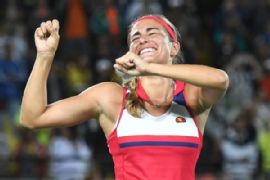|
Monica Puig knew her Olympic gold medal had touched something deep in her homeland as soon as she stepped off the plane last August and saw the hordes of people waiting to welcome her. She was moved further when there were fans waiting at her hotel, flooding the streets and following her every move. But it wasn’t until several little girls approached her on her trip home that Puig fully realized the impact she had made when she became the first Puerto Rican woman in 68 years of Summer Olympics to win a medal -- and the first from her country to capture gold. “They started crying when they saw me,” Puig said, still sounding amazed two months after the world’s then-34th-ranked player upset second-seeded Angelique Kerber 6-4, 4-6, 6-1 in the gold-medal match. “The country looks up to me, and when they say, ‘We’re working hard to be just like you,’ it makes me feel like I’m a great example for Puerto Rico,” Puig said. “It really warms my heart that I have a lot of supporters, but also that I’m influencing people. … I want to set an example for youth today -- that you can make any dream come true if you work hard to get it.” Puig is just as passionate about the future of Puerto Rico itself. She has been working with local officials to help raise awareness about prevention and protection from the Zika virus, urging tourists not to stay away. Just in the last week alone, two women’s college basketball tournaments that were to be played in the debt-plagued country in December were moved to other locations because of fears over the outbreak. In May, Major League Baseball relocated a Pirates-Marlins game scheduled for Puerto Rico to Miami instead. Puerto Rican’s tourism industry has been hit especially hard; Bloomberg.com cited the Zika outbreak to blame and in August reported the country’s economy is forecast to decline by two percent in fiscal 2017. The U.S. Centers for Disease Control and Prevention has determined that Zika, most often spread by mosquito bites, can cause microcephaly, a birth defect that causes infants to be born with unusually small heads. “I know a lot of people are probably scared of Zika, but less than one percent of Puerto Ricans have Zika, and Puerto Rico is also taking normal precautions as any country would do to prevent more people getting it,” Puig said. “We’re trying to get more people to enjoy a worry-free vacation. People who are pregnant or looking to become pregnant should take necessary precautions. But people who just want to enjoy a good vacation shouldn’t worry about it. “Puerto Rico means the world to me, and it’s really about showing it to the world. The gold medal I won wasn’t just for me; it was for Puerto Rico. I want everyone to experience it.” Ingrid Rivera Rocafort, executive director of Puerto Rico Tourism Co., said an estimated 26,000 people in Puerto Rico have become infected with Zika since December. That includes about 1,900 pregnant women, both statistics falling far short of original estimates by the CDC. The PRTC sponsors Puig, who began working for them in 2013. “She has been terrific,” Rivera Rocafort said. “Monica is young, energetic and a great representative and ambassador for Puerto Rico. She’s a great communicator.” Puig moved with her family from Puerto Rico to Miami as a baby, but she has competed for the birth country since her teenage years. And she does have some tennis in her DNA; her mother, Astrid, was a top junior in Puerto Rico. But ranked No. 92 at the end of 2015, Monica Puig is the first to admit that winning the gold medal was as big a shock to her as to anyone. “I remember walking into the stadium for Opening Ceremonies and thinking, ‘Wow, so many people here will be Olympic gold medalists, and I could be one,’ but I never really believed it until I made the quarterfinals,” Puig said. “That was huge for me. Then the medal round I thought, ‘I have to secure a medal.’ Then in the gold-medal match, I thought, ‘I’m going for it all.’ “I think a different side of me just came out. Obviously, I have to translate that to my normal game because the WTA is not the same thing. But it was an unbelievable week of my life.” However, in the three tournaments since the Olympics, Puig has lost in the first round in three of four tournaments. The weight of being the gold-medal winner, she concedes, carries an added burden. “It’s a new responsibility, a new pressure on my shoulders,” she said. “But I’m obviously still very young at 23 years old and still getting used to this new wave of attention. But I know I’ll learn to manage this and come into my own in my own time.  “I’m not in a hurry to accelerate it. I want to learn, rack up as much experience as I can and let that experience show. What I’ve done as a just-turned 23-year-old [Sept. 27] is still incredible.” And Puig said she can still use that gold-medal victory as a source of confidence and inspiration. “I think it really comes into play when things start going south, when things are really dark and I start losing to say, 'Hey, this is something no one can take away from me, no matter how down in dumps I am, that’s an accomplishment that will be part of history forever.’ I take comfort in that.” More importantly is the way she can use her Olympic experience off the court. “Everything post-Olympics was a bit of a shock to me, but I think looking at it now," Puig said. "It’s a huge opportunity for me to really express my gratitude to my country and let people know where I come from, and in a way, show off the attitude Puerto Ricans bring to the table. “It’s always good to have a positive voice and a positive impact on people, and there are a lot of important messages I want to send post-Olympics -- about Zika, but also that if women and girls across the world have a dream, they can achieve it. The Olympics made my voice a little louder than it was before. And it’s always nice to give back to people who have given so much to me over the years.”
|

